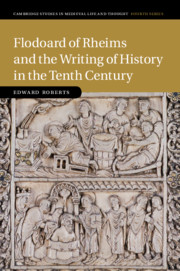Book contents
- Flodoard of Rheims and the Writing of History in the Tenth Century
- Cambridge Studies in Medieval Life and Thought
- Flodoard of Rheims and the Writing of History in the Tenth Century
- Copyright page
- Dedication
- Contents
- Tables
- Acknowledgements
- Abbreviations
- Introduction
- Chapter 1 Flodoard, His Archbishops and the Struggle for Rheims
- Chapter 2 Narrative and History in the Annals
- Chapter 3 Institutional History and Ecclesiastical Property
- Chapter 4 History, Poetry and Intellectual Life
- Chapter 5 Flodoard’s Age of Miracles
- Conclusion
- Bibliography
- Index
Chapter 4 - History, Poetry and Intellectual Life
Published online by Cambridge University Press: 05 September 2019
- Flodoard of Rheims and the Writing of History in the Tenth Century
- Cambridge Studies in Medieval Life and Thought
- Flodoard of Rheims and the Writing of History in the Tenth Century
- Copyright page
- Dedication
- Contents
- Tables
- Acknowledgements
- Abbreviations
- Introduction
- Chapter 1 Flodoard, His Archbishops and the Struggle for Rheims
- Chapter 2 Narrative and History in the Annals
- Chapter 3 Institutional History and Ecclesiastical Property
- Chapter 4 History, Poetry and Intellectual Life
- Chapter 5 Flodoard’s Age of Miracles
- Conclusion
- Bibliography
- Index
Summary
Flodoard’s The Triumphs of Christ, an epic history of Christianity narrated in almost 20,000 lines of hexameter, is one of the longest and most remarkable poems to have survived from the early Middle Ages. It has been highly neglected by both historians and literary scholars, however, who have tended to look upon it as a simple compilation and versification of earlier Christian historiography and hagiography. The fundamental argument of this chapter is that this characterisation is unjust, and that the Triumphs is in fact a work of considerable innovation that sheds light on education, literary culture and intellectual life in the tenth century. An examination of the structure, content and sources of the poem demonstrates that Flodoard conceived the poem as a continuation of the biblical epics of late antiquity. I then explore the implications of this for why Flodoard composed the work and what it reveals about his notions of history and history-writing. By using the Triumphs as a window onto Flodoard’s intellectual activities and networks, I suggest that the early tenth-century Latin West was not the literary desert it is often portrayed as.
Keywords
- Type
- Chapter
- Information
- Publisher: Cambridge University PressPrint publication year: 2019

